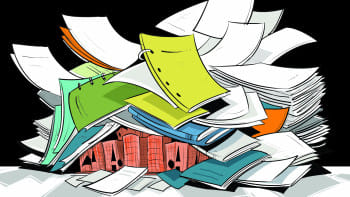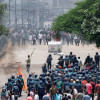Clarification, or admission of guilt?

Following a social media storm, the Bangla Academy has now explained its decision as to why it barred the publishing house Adarsha from taking part in this year's Ekushey Book Fair, the most desired annual book exposition for publishers and readers. The clarification issued by the academy, however, raises more questions than explaining the rationale behind its decision. The worst part in the academy's attempt to clear the air is the admission in its statement that it had not read the alleged offending book before deciding to exclude its publisher from the exhibition.
The Bangla Academy press release, issued on January 21, 2023, and signed by its deputy director Mohammad Akbar Hossain, stated that the academy's attention had been drawn to news reports in various media outlets, which claimed that Adarsha was not allotted a stall at the book fair. It noted that the lottery for allocations of stalls was scheduled to be held on January 22, 2023.
Up until this point, it seemed the academy was simply refuting an unjustified claim based on assumption. But the statement then added that the management committee of the Amar Ekushey Book Fair had collected the book "Bangaleer Mediocrity-r Shondhane," written by Faham Abdus Salam and published by Adarsha. According to the press release, the committee members opined that the book did not meet the conditions set out in sub-paragraphs 14.14 and 14.15 of Article 14 of the Rules and Regulations of the Book Fair.
It also spoke about contacting Adarsha CEO Mahabub Rahman on behalf of the committee, seeking assurances that the disputed book would not be kept and displayed at the book fair, which he refused to accept. It added that. in this situation, the book fair management committee decided that the publishing house will be considered ineligible to participate in the stall allocation lottery, in view of its refusal to comply with standard stall allocation conditions.
The chronology of the developments given by the academy is very different from what the Adarsha owner has been saying to the media and in his Facebook posts. Mahabub started making his suspicion of being banned from the fair known much earlier by saying that he had received forewarnings about three books that were very critical of the government and its policies and actions. The books he named are "Oprotiroddho Unnayaner Obhabonio Kothamala" by Faiz Ahmad Taiyeb, "Bangaleer Mediocrity-r Shondhane" by Faham Abdus Salam, and "Unnayan Bivram" by Zia Hasan. He termed it as an attempt to censor or gag freedom of thought and expression.

The academy statement seems to have given more credence to this allegation of the ban being predetermined. Otherwise, why would the committee be screening a particular book before holding the lottery? Why carry out a preemptive action, when it has the authority to cancel any allocation for violating the code of conduct or rules they agree to abide by?
In the past, there were quite a few instances when the academy shut down a couple of stalls for allegedly violating its rules, though not without commotion and protests.
The book in dispute, mentioned in the academy statement, is written by Faham Abdus Salam, who happens to be married to one of the daughters of BNP Secretary General Mirza Fakhrul Islam Alamgir. This raises questions about his apparent victimisation for political association. Discarding such allegations isn't easy, as the publisher has claimed that the book was displayed and sold in the Ekushey Book Fair in 2022.
Critics of the academy's decision have termed it a violation of freedom of speech, and against the spirit and ideals of the Language Movement. The Bangla Academy was established on the values and ideals of the Language Movement, and therefore, it should never allow its institutional role to be used as a tool to suppress political dissent.
These decisions, too, are not universal, but are divided along partisan political lines. As a result, such acts of politically motivated censorship keep happening.
Although the Bangla Academy Act 2013 was supposed to be strengthening the academy's independence and self-regulation, it has made it easier for the government to exercise direct and indirect control over running the affairs of the academy. The Act, which came into effect on September 22, 2013, allows the government to nominate greater numbers to the executive committee than the numbers nominated by the general assembly – the body representing general members – and fellows of the academy.
In the midst of this controversy, the latest story is that the academy has been forced to replace thousands of invitation cards to include the government's emblem above the academy logo, for the first time since the enactment of the act. This is a clear intervention in the affairs of a statutory autonomous body, which is undesired and deplorable.
Despite the fact that Article 20 (1) of the act says, "Subject to the other provisions of this Act, the overall authority of the Academy shall vest in the General Assembly," and article 20(2) says, "The General Assembly shall supervise and review the activities of the Academy and shall give necessary directions to the Executive Council," the dominance of bureaucrats and partisan academics establishes de facto control of the government over the academy.
Unless these legal loopholes are amended, for which strong social unity is necessary, there is little hope that the institution that emerged as an icon of free speech will ever be truly autonomous.
Kamal Ahmed is an independent journalist. His Twitter handle is @ahmedka1

 For all latest news, follow The Daily Star's Google News channel.
For all latest news, follow The Daily Star's Google News channel. 











Comments